【预讲练结四步教学法】英语人教版必修UnitFestivalsaroundtheworld预习
高中英语人教版必修3教案-Unit_1_Festivals_around_the_world_教学设计_教案_4
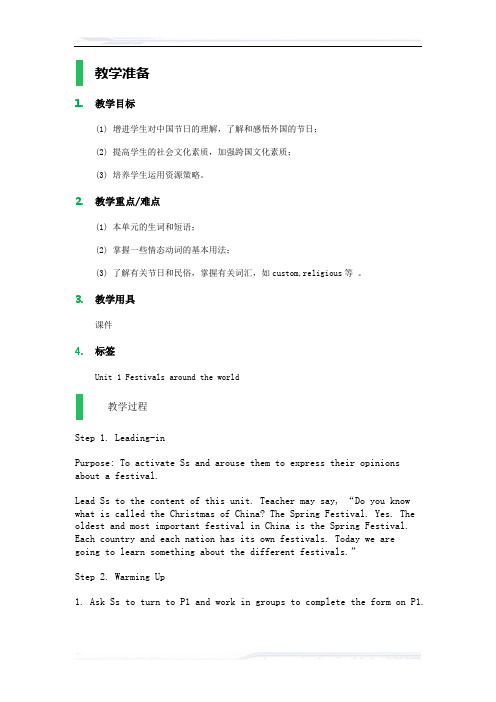
教学准备1. 教学目标(1) 增进学生对中国节日的理解,了解和感悟外国的节日;(2) 提高学生的社会文化素质,加强跨国文化素质;(3) 培养学生运用资源策略。
2. 教学重点/难点(1) 本单元的生词和短语;(2) 掌握一些情态动词的基本用法;(3) 了解有关节日和民俗,掌握有关词汇,如custom,religious等。
3. 教学用具课件4. 标签Unit 1 Festivals around the world教学过程Step 1. Leading-inPurpose: To activate Ss and arouse them to express their opinions about a festival.Lead Ss to the content of this unit. Teacher may say, “Do you know what is called the Christmas of China? The Spring Festival. Yes. The oldest and most important festival in China is the Spring Festival. Each country and each nation has its own festivals. Today we aregoing to learn something about the different festivals.”Step 2. Warming Up1. Ask Ss to turn to P1 and work in groups to complete the form on P1.2. Ask Ss to discuss festivals they have filled in the form and their importance to the society. After that, ask Ss to present their opinions to all classmates.Step 3. Pre-listeningPurpose: To help Ss learn about the context of the Listening text.Ask Ss to talk about the following questions to get them prepared to listen to the reading text.1. How many ancient festivals do you know?2. Are foreign festivals different from Chinese festivals? In what part?Step 4. ListeningPurpose: To get the main information in the listening part.To develop Ss’ listening abilityTo learn some information about the festivals around the world.Ask Ss to listen to the tape, focus on the subjects mentioned in the passage and then answer the following question.1. How many kinds of festivals were mentioned in the text?Suggested Answer: Five.2. What are they?Suggested Answer:Ancient FestivalsFestivals of the DeadFestivals to Honor PeopleHarvest FestivalsSpring FestivalsStep 5. Pre- readingDivide Ss into groups of four and ask them to discuss the following questions.1. What’s your favorite holiday of the year? Why?2. What festivals or celebrations do you enjoy in your city or town? Do you like spending festivals with your family or with friends? What part of a festival do you like best---the music, the things to see, the visits or the food?Step 6. Fast readingAsk Ss to read the text quickly and answer the following questions.1. What are festivals of the dead usually for?2. What make autumn festivals happy events?3. What do people usually do at spring festivals?4. What is one important reason to have festivals and celebrations?5. Compare the festivals of the dead in Mexico, Japan and China. What things are similar? What things are different?Suggested Answers:1. Festivals of the dead are for honoring or satisfying dead ancestors or others, who some people believe might return to help or harm living people.2. Autumn festivals are happy events because people are thankful that food is ready for winter and the hard farm work is finished.3. At spring festivals, people usually have dances, carnivals and other activities to celebrate the end of winter and the coming of spring.4. It is important to have festivals and celebrations so we can enjoy life / be proud of our customs / forget our work for a little while.5. The Chinese, Japanese and Mexican festivals of the dead all have customs to honour the dead. The Chinese and Japanese go to clean their ancestors’ graves, and the Mexican offer food,flowers and gifts to the dead. However, there are some differences. The Mexicans eat special food that looks like bones, something the Chinese and Japanese do not do.Step 7. Intensive reading1. Ask Ss to read the text carefully and sum up the main idea of each part.2. Discuss in pairs which festivals you think are the most important and which are the most fun. Then fill in the chart with your ideas.Type of festival Example of festival Reasons for your choiceMost importantMost funSuggested Answer:Various answers are acceptable.3. Ask Ss the following question and encourage Ss to give some similarities that they think festivals have, and give their reasons. Then invites Ss to tell the similarities and then ask them to present them before the class.What similarities can you find among these festivals?Suggested Answer:They most include food, music or entertainment, like dances, light or fire.They are most together with family and friends.Festivals exist everywhere.Many of them celebrate similar ideas and important cultural events or remember event of people.Human beings need to have things in life to celebrate and have a break from daily struggles and demands.Step 8. HomeworkPurpose: To get a further understanding of the text.1. Ask Ss to continue discussing their opinions about festivals with their partners.2. Ask Ss to read the text once again and try to retell the text.3. Ask Ss to discover useful words and expressions in the text.课堂小结学了这节课,你有什么收获?课后习题完成课后练习题。
【预讲练结四步教学法】英语人教版选修UnitTravellingabroad预习
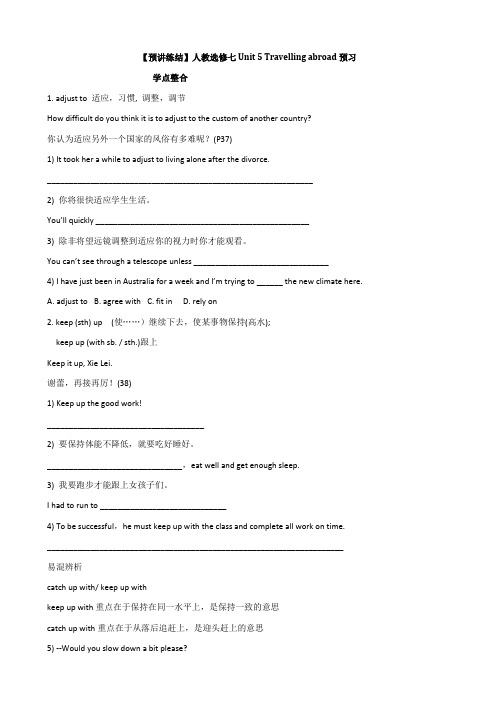
【预讲练结】人教选修七Unit 5 Travelling abroad预习学点整合1. adjust to 适应,习惯, 调整,调节How difficult do you think it is to adjust to the custom of another country?你认为适应另外一个国家的风俗有多难呢?(P37)1) It took her a while to adjust to living alone after the divorce._____________________________________________________________2) 你将很快适应学生生活。
You’ll quickly _________________________________________________3) 除非将望远镜调整到适应你的视力时你才能观看。
You can’t see through a telescope unless _______________________________4) I ha ve just been in Australia for a week and I’m trying to ______ the new climate here.A. adjust toB. agree withC. fit inD. rely on2. keep (sth) up (使……)继续下去,使某事物保持(高水);keep up (with sb. / sth.)跟上Keep it up, Xie Lei.谢蕾,再接再厉!(38)1) Keep up the good work!____________________________________2) 要保持体能不降低,就要吃好睡好。
_______________________________,eat well and get enough sleep.3) 我要跑步才能跟上女孩子们。
高中英语Unit1《Festivalsaroundtheworld》学案(2)(新人教版必修3)教案
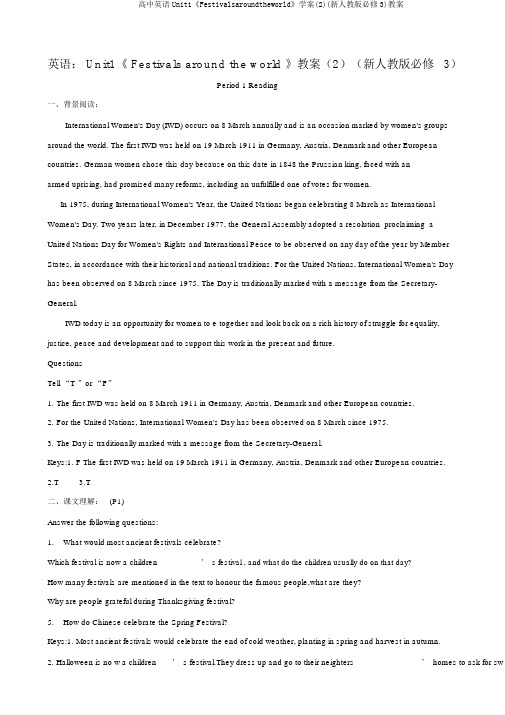
高中英语Unit1《Festivalsaroundtheworld》学案(2)(新人教版必修3)教案英语: Unit1《 Festivals around the world 》教案(2)(新人教版必修3)Period 1 Reading一、背景阅读:International Women's Day (IWD) occurs on 8 March annually and is an occasion marked by women's groupsaround the world. The first IWD was held on 19 March 1911 in Germany, Austria, Denmark and other Europeancountries. German women chose this day because on this date in 1848 the Prussian king, faced with anarmed uprising, had promised many reforms, including an unfulfilled one of votes for women.In 1975, during International Women's Year, the United Nations began celebrating 8 March as InternationalWomen's Day. Two years later, in December 1977, the General Assembly adopted a resolution proclaiming aUnited Nations Day for Women's Rights and International Peace to be observed on any day of the year by MemberStates, in accordance with their historical and national traditions. For the United Nations, International Women's Dayhas been observed on 8 March since 1975. The Day is traditionally marked with a message from the Secretary-General.IWD today is an opportunity for women to e together and look back on a rich history of struggle for equality,justice, peace and development and to support this work in the present and future.QuestionsTell “T ”or “F”1.The first IWD was held on 8 March 1911 in Germany, Austria, Denmark and other European countries.2.For the United Nations, International Women's Day has been observed on 8 March since 1975.3.The Day is traditionally marked with a message from the Secretary-General.Keys:1. F The first IWD was held on 19 March 1911 in Germany, Austria, Denmark and other European countries.2.T3.T二、课文理解:(P1)Answer the following questions:1.What would most ancient festivals celebrate?Which festival is now a children’ s festival , and what do the children usually do on that day?How many festivals are mentioned in the text to honour the famous people,what are they?Why are people grateful during Thanksgiving festival?5.How do Chinese celebrate the Spring Festival?Keys:1. Most ancient festivals would celebrate the end of cold weather, planting in spring and harvest in autumn.2. Halloween is no w a children’ s festival.They dress up and go to their neighters’ homes to ask for sw3.Three festivals are mentioned to honour famous people. They are the dragon Boat Festival in China, Columbus Day in the USA, the National Festival in India.4.People are grateful because their food is gathered for the winter and the agricultural work is over.5.At the Spring Festival in China, people eat dumpings, fish and meat and may give children lucky money in red paper.There are dragon dances and carnivals, and families celebrate the Lunar New Year together.三、课文理解:(P7)Put the statements on the passage A Sad Love Story in correct order.Li Fang met Hu Jin at the tea shop on the corner on his way home.Hu Jin told Li Fang she would meet him at the coffee shop after work.Li Fang felt much regretted having misunderstood Hu Jin and missed the date with her.The manager of the coffee shop turned on the TV on which was a sad Chinese love story being told.Li Fang threw away flowers and chocolates bought for Hu Jin.Li Fang thought the love story between him and Hu Jin were like that between Niulang and Zhinu.Hu Jin didn ’tturn up and Li Fang felt much disappointed and depressed.8.The manager of the TV programme expressed her hope that everyone could meet the one he or she loved that day.The correct order: _______________________________________Key: 2. 7. 4. 6. 8. 5. 1. 3.Period 2Language points(1)1.[ 原文再现 ]Most ancient festivals would celebrate the end of cold weather, planting in spring and harvest autumn. (P1) 最古老的节日老是庆贺寒冷的结束,春季的栽种和秋季的收割。
人教版高中英语必修三Unit1Festivalsaroundtheworld
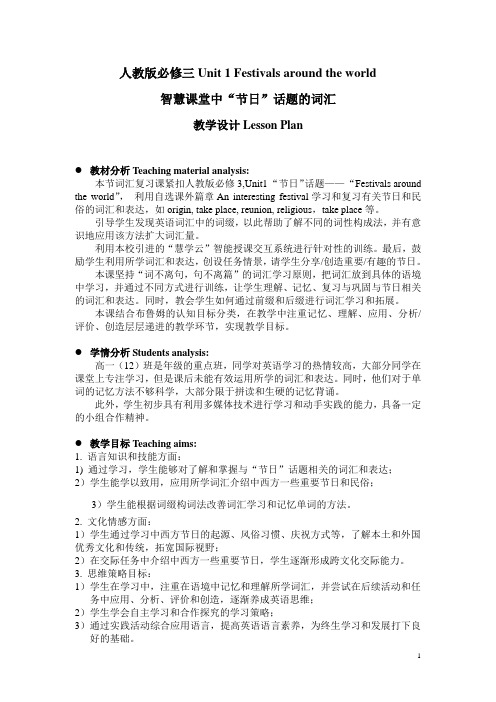
人教版必修三Unit 1 Festivals around the world智慧课堂中“节日”话题的词汇教学设计Lesson Plan●教材分析Teaching material analysis:本节词汇复习课紧扣人教版必修3,Unit1 “节日”话题——“Festivals around the world”,利用自选课外篇章An interesting festival学习和复习有关节日和民俗的词汇和表达,如origin, take place, reunion, religious,take place等。
引导学生发现英语词汇中的词缀,以此帮助了解不同的词性构成法,并有意识地应用该方法扩大词汇量。
利用本校引进的“慧学云”智能授课交互系统进行针对性的训练。
最后,鼓励学生利用所学词汇和表达,创设任务情景,请学生分享/创造重要/有趣的节日。
本课坚持“词不离句,句不离篇”的词汇学习原则,把词汇放到具体的语境中学习,并通过不同方式进行训练,让学生理解、记忆、复习与巩固与节日相关的词汇和表达。
同时,教会学生如何通过前缀和后缀进行词汇学习和拓展。
本课结合布鲁姆的认知目标分类,在教学中注重记忆、理解、应用、分析/评价、创造层层递进的教学环节,实现教学目标。
●学情分析Students analysis:高一(12)班是年级的重点班,同学对英语学习的热情较高,大部分同学在课堂上专注学习,但是课后未能有效运用所学的词汇和表达。
同时,他们对于单词的记忆方法不够科学,大部分限于拼读和生硬的记忆背诵。
此外,学生初步具有利用多媒体技术进行学习和动手实践的能力,具备一定的小组合作精神。
●教学目标Teaching aims:1. 语言知识和技能方面:1) 通过学习,学生能够对了解和掌握与“节日”话题相关的词汇和表达;2)学生能学以致用,应用所学词汇介绍中西方一些重要节日和民俗;3)学生能根据词缀构词法改善词汇学习和记忆单词的方法。
高一Unit 1《Festivals around the world》教案人教版
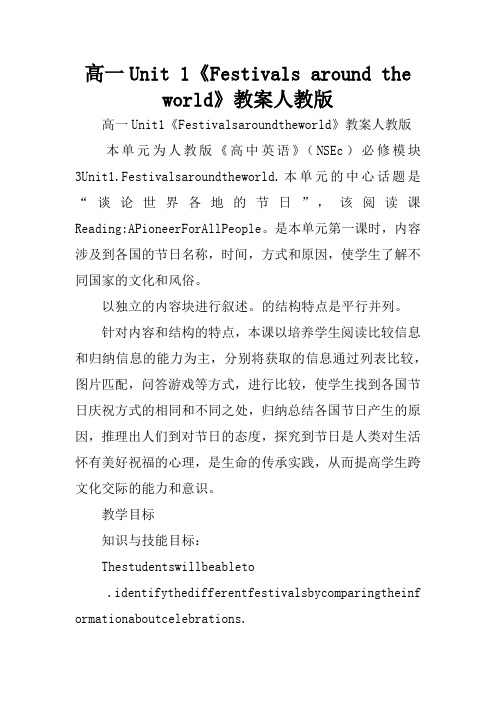
高一Unit 1《Festivals around theworld》教案人教版高一Unit1《Festivalsaroundtheworld》教案人教版本单元为人教版《高中英语》(NSEc)必修模块3Unit1.Festivalsaroundtheworld.本单元的中心话题是“谈论世界各地的节日”,该阅读课Reading:APioneerForAllPeople。
是本单元第一课时,内容涉及到各国的节日名称,时间,方式和原因,使学生了解不同国家的文化和风俗。
以独立的内容块进行叙述。
的结构特点是平行并列。
针对内容和结构的特点,本课以培养学生阅读比较信息和归纳信息的能力为主,分别将获取的信息通过列表比较,图片匹配,问答游戏等方式,进行比较,使学生找到各国节日庆祝方式的相同和不同之处,归纳总结各国节日产生的原因,推理出人们到对节日的态度,探究到节日是人类对生活怀有美好祝福的心理,是生命的传承实践,从而提高学生跨文化交际的能力和意识。
教学目标知识与技能目标:Thestudentswillbeableto.identifythedifferentfestivalsbycomparingtheinf ormationaboutcelebrations.2.explainthereasonwhythefestivalscomeintobeingbyfin dingoutthesimilaritiesanddifferences.3.describetheirfavoritefestivalsbyusingthelanguagef romthetext.教学重点和难点)为全体学生进行有效性阅读策略的指导,包括语篇分析、猜测词义,逻辑推理、归纳概括等技巧。
2)通过比较信息,归纳总结各国节日产生的原因,推理出人们到对节日的态度和节日的意义。
教学过程教学步骤教学活动设计意图Pre-reading:Step1.Brainstorm:motivatetheSsbyaskingsomequestions.Q1:Doyouanyfestivalsaroundtheworld?Step2.matchthecelebrationwiththefestivals.Q2:DoyouknowhowpeoplecelebratetheseFestivals?Doaquiz.Step2.DiscussionSsdiscussthefollowingquestionsQ1:Howdotheycomeintobeing?Q2:whatdotheyhaveincommon?Andwhataretheredifference amongthem?问题引发了学生的思考,调动学生的已知,将学生的思维活动引导到课文主题上来。
2021人教版必修三unit1《festivalsaroundtheworld》word教案3

2021人教版必修三unit1《festivalsaroundtheworld》word教案3第一单元Reading Festivals and celebrations 教案1. 教学设计理念语言的学习离不开文化,英语教学从某种程度上来讲确实是文化教学,对英语文化的了解和明白得有利于加深本国文化的学习,培养爱国主义精神,也有利于提高人文素养。
因此传授文化知识、培养文化意识和世界意识,是英语教学中一个专门重要的任务。
①运用任务型语言教学模式,训练培养学生对语言的综合运用能力.②课堂以学生为主体,以任务为主线,重视体验参与,教师起到“设计者、研究者、促进者、和谐者”的作用.③在教学中,突出交际性,注重读写的有用性,要进行情感和策略调整,以形成积极的学习态度,促进语言实际运用能力的提高.④正视个体差异,倡导过程鼓舞,以多层次、多角度、多主体的结果与过程并重的评判方式鼓舞学生进步.2. 教材分析本单元以节日为话题,介绍古今中外节日的种类、由来、意义以及人们的活动和习俗,旨在通过对世界各地的节日名称、由来及庆祝方式的讨论和学习,让学生在多样的东西方节日、文化中进行比较,并发觉节日文化的共性、多样性和民族专门性,从而增进对多种文化节日的明白得,进而拓展社会文化背景、增加跨国文化知识.3. 教学目标①关心学生了解世界各地的节日.②了解节日的分类并进而明白得节日庆祝的意义.③通过阅读材料连续训练学生略读,细读,推测词义,归纳等阅读技巧.4. 重难点①明白得节日的起源及意义,增强文化爱护意识②通过学生对多样的东西方节日、文化所进行的比较,发觉节日文化的共性、多样性和民族专门性,从而增进对多种文化节日的明白得。
5. 教学步骤Unit 1 Festivals around the worldLearning aims : 1.learn about festivals around the world.2. learn about the kinds of festivals and the reason for celebrating them.3. train reading skills such as skimming and summarizing.Difficult points : the reason for peopke’s celebrating festivalsStep 1 Warming up1.What other traditional festivals in China do you know ?______________________________________________________________2.What festivals of foreign countries do you know?______________________________________________________________ Step 2 ReadingI.Fasting reading fill in the chartII.Careful readingTask 1 main ideas of each paragraph 1).2). Festivals to Honour People (Match the person with the festival.)1. Qu Y uan a. the Dragon Boat Festival2. Christopher Columbus b. an Indian national festival on Oct. 23. Mohandas Gandhi c. Columbus Day3). Harvest Festivals (Choose the best answer.)Many activities can be held in harvest festivals EXCEPT that people ___.A. get together to have mealsB. decorate houses to admire the moonC. win awards for their farm produceD. enjoy mooncakes4.)Task 2 True or False1. The ancient people needn’t worry about their food.2. Halloween used to be a festival to honor the dead.3. Qu Y uan was a great poet who people honor a lot in China.4. Mid-autumn Festival is held to celebrate the end of autumn.5. Easter celebrates the birth of Jesus.Task 3 Answer the questions1.What are festivals of the dead usually for?2. What makes autumn festivals happy events?3. What do people usually do at spring festivals?4. What is one important reason to have festivals and celebrations?III. Free talkingWhat do most festivals seem to have in common ?Step 3 Discussing◆What is your favourite festival? Why?◆When is it? What is the festival about?◆How long can we have for holiday? What do we usually do in the festival? Step 4 HomeworkWrite a short passage about your favorite festival。
英语:unit1《festivals around the world》教案(9)(新人教版必修3).doc

英语:Unit1《Festivals around the world》教案(9)(新人教版必修3)------(必修3 unit 1 人教新课标)3教材分析和教材重组教材分析本单元以节日为话题,介绍了世界各地的一些节日、含义、由来和民俗。
通过本单元的学习,可以帮助学生更多地了解节日、体味文化;同时又能教育学生理解、尊重不同的文化和习俗。
通过本单元的语言技能训练,要求学生学会使用请求以及感谢的表达法。
1. Warming Up 要求学生以小组形式完成一个表格填充,列出中国的五个节日和这些节日的时间、庆祝的内容以及节日里人们的所作所为。
激发学生的阅读兴趣,为本单元Reading部分的世界节日做好铺垫。
2. Pre-reading 通过若干个问题了解学生对节日的认识,比如:你最喜欢的节日是什么?你喜欢与家人还是与朋友共度佳节?你喜欢节日的哪部分——音乐、拜访朋友,可看的还是可吃的?3. Reading 由五篇小短文组成,分别介绍古代节日、亡灵节、纪念名人的节日、丰收节和春天的节日等,使学生了解节日的由来及其存在的意义。
最古老的节日主要庆祝冬天的结束,春天的播种,秋天的收获等。
鬼节是为祭奠亡灵,取悦祖先而举行的节日,例如日本的盂兰盆节(Obon),墨西哥的亡灵节,万圣节(Halloween)等。
纪念名人的节日有中国的端午节,美国的哥伦布日,印度的甘地纪念日。
春天的节日包括中国的春节,西方的狂欢节、复活节,日本的樱花节。
4. Comprehending 第一部分提出的6个问题让学生对所读文章有一个浅层理解。
第二部分要求学生讨论哪些节日是最重要的,哪些是最有趣的,结合所读文章和自己的想法填表。
第三部分要求找出各个节日中共有的三件事,然后与同伴讨论为什么这些事情对各地的人们都是重要的。
这一任务不仅使学生重温所读文章的内容,而且结合他们的实际,给学生机会阐述自己的想法和观点,挖掘学生的思维潜力。
这3个练习的设置由表及里,由浅入深,非常科学。
【预讲练结四步教学法】英语人教版必修UnitTheMillionPoundBankNote讲读
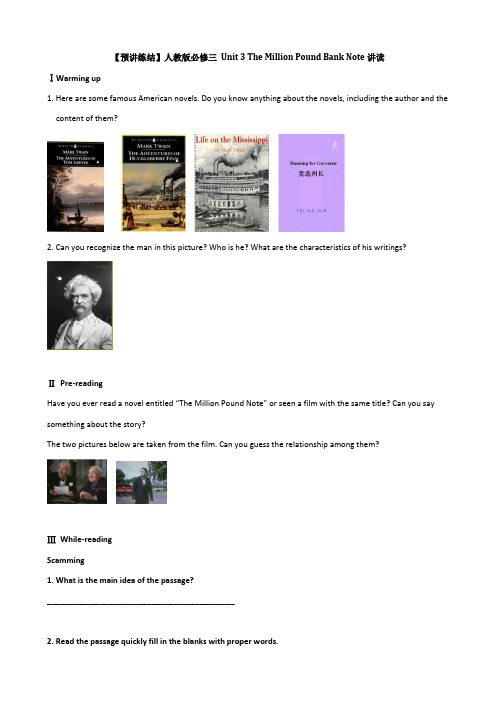
【预讲练结】人教版必修三Unit 3 The Million Pound Bank Note讲读ⅠWarming up1. Here are some famous American novels. Do you know anything about the novels, including the author and the content of them?2. Can you recognize the man in this picture? Who is he? What are the characteristics of his writings?ⅡPre-readingHave you ever read a novel entitled “The Million Pound Note” or seen a film with the same title? Can you say something about the story?The two pictures below are taken from the film. Can you guess the relationship among them?ⅢWhile-readingScamming1. What is the main idea of the passage?___________________________________________2. Read the passage quickly fill in the blanks with proper words.Careful reading :Answer the following questions according to the passage.1) Why is Henry lost in London? How did he get there?__________________________________________________________2) How many questions do the brothers ask Henry? What are they? What is the concern of the brothers?___________________________________________________3) Can you imagine what happened when Henry went to the American Embassy? Give your reasons.____________________________________________________4) Why do you think that the brothers chose Henry for their bet?____________________________________________________5) Can you guess why the brothers do not permit Henry to open the letter until 2 o’clock?_____________________________________________________6) What kind of person do you think Henry is?__________________________________________________________7. What kind of person do you think the brothers are?________________________________________________________ⅣPost-reading1. Read the text carefully again and choose the best answers.1). Why did the brothers make a bet?A. They wanted to make fun of Henry.B. They wanted to rob Henry of some money.C. To see whether a man could survive with a million pound bank note a month in London.D. They wanted to make Henry their son-in-law.2). Why did Henry wander in London streets?A. He was visiting an old friend.B. He was a citizen of LondonC. He was on businessD. He landed in Britain by accident without money.3). What kind of person was Henry Adams?A. BraveB. ShyC. HonestD. Rich4). How did Henry feel when he got a letter from the brothers?A. AngryB. HopefulC. SurprisedD. Worried5). Why does Oliver clap his hands saying “what luck”?A. Because Henry is the very person they want to find.B. Because Henry is rescued at sea by a British shipC. Because he has made a lot of money.D. Because Henry has no friend.2. Read the statement below after reading Act 1, Scene3. Write “F” if it is a fact; write “O” if it is an opinion.1).Heny wants to find a job in London.2).Henry is given an envelope by two brothers.3).Henry is unlucky young man.4).The servant is called James.5).Henry is foolish to go and meet the two brothers.3. Reorder the following jumbled sentences.A. The brothers gave him a letter.B. Henry wandered in London streets.C. About a month ago Henry Adams was sailing out of the bay.D. The next morning he was spotted by a ship.E. Towards nightfall he found himself carried out to sea by a strong wind.F. On the ship he earned his passage by working as an o unpaid hand.4. Choose the best word to fill the passageHenry was an 1)________. One day he had an accident in a 2)________. Luckily, he was rescued by a ship to 3)_______. He arrived in London by earning his passage without 4)________. The he was lost in the street in 5)________. To his surprise, an unbelievable thing happened to him. Two rich 6)________ gave him a 7)_______ containing a million 8)_______ note. But he was told not to open the letter 9)_______ two o’clock. Henry promised that he would do as he was told and then said 10)__________ to the two brothers.答案:While-reading:Scamming:1. The text is a story about an American businessman who is lost in London but is lucky enough to be invited to a big house by two rich brothers and given an envelope with a million pound bank note in it by them who have made a bet.2. 1) sailing 2) carried 3) spotted 4) London 5) lost 6) called 7) letterCareful reading:1). It was his first trip to London. He was spotted and brought to London by a ship by working as an unpaid hand after being carried out to sea by a strong wind.2). Three.What about his plans, what about his job in America and how much money he has.3).He received no help.He was not anxious and hungry and eager for a job if the American Embassy offered him help.4).Because they think Henry is hardworking, honest and penniless.5).They are afraid that Henry will refuse the bank note.6).He is proud, honest, hardworking and careless.7). They are rich, incredible, trusting and have good judge of character.Post-reading1. CDCCA2. 1) F 2)F 3)O 4)F 5)O3. C-E-D-F-B-A4. 1) American 2) bay 3) London 4) pay 5) rags 6) brothers 7)letter 8) pound 9) until 1) goodbye。
【预讲练结四步教学法】英语人教版必修UnitHealthyeating讲读
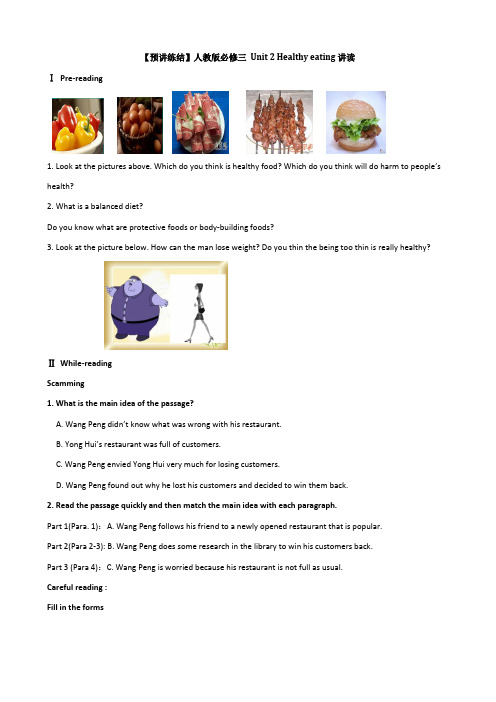
【预讲练结】人教版必修三Unit 2 Healthy eating讲读ⅠPre-reading1. Look at the pictures above. Which do you think is healthy food? Which do you think will do harm to people’s health?2. What is a balanced diet?Do you know what are protective foods or body-building foods?3. Look at the picture below. How can the man lose weight? Do you thin the being too thin is really healthy?ⅡWhile-readingScamming1. What is the main idea of the passage?A. Wang Peng didn’t know what was wrong with his restaurant.B. Yong Hui’s restaurant was full of customers.C. Wang Peng envied Yong Hui very much for losing customers.D. Wang Peng found out why he lost his customers and decided to win them back.2. Read the passage quickly and then match the main idea with each paragraph.Part 1(Para. 1):A. Wang Peng follows his friend to a newly opened restaurant that is popular.Part 2(Para 2-3): B. Wang Peng does some research in the library to win his customers back.Part 3 (Para 4):C. Wang Peng is worried because his restaurant is not full as usual.Careful reading :Fill in the formsComparison of the two restaurantsⅢPost-reading1. Read the text carefully again and choose the best answers.1). When Wang Peng thought “Nothing could be better”, he means _________.A. His food and drinks were the best.His food and drinks were the worst.C. His food should have been improved.D.He could do nothing with his food and drinks.2) Why did Wang Peng go into the newly-opened restaurant?A. Because he was angry.B. Because he was curious.C. Because he wanted to blame its owner.D. Because he wanted to ask for advice.3) What is Wang Peng’s impression on Yong Hui’s restaurant?A. Alll the customers in it were very slim.B. It was too small and too noisy.C. The food in it was very nice and better than that in his.D. There was so limited food but the price was much higher.4) Yong Hui was very angry when she came to Wang Peng’s restaurant because ________.A. she thought he was a new customerB. she thought he had spied on her restaurantC. she was told he was a spyD. he was too fat5) We can infer from the last sentence that _________.A. Wang Peng would learn from Yong Hui.B. Yong Hui would learn from Wang Peng.C. The competition had began and would continue.D. The two restaurants would give up the competition.2.True (T) or False (F)1) Usually Wang Peng’s restaurant was full of people.2) Yong Hui could make people thin in two weeks by giving them a good diet.3) Wang Peng’s customers often became fat after eating in his restaurant.4) Yong Hui’s menu gave them energy foods.5) Wang Peng’s menu gave customers more prospective food.6) Wang Peng decided to copy Yong Hui’s menu.7) Wang Peng drove back home, full of hope that he would win the competition.3. Reorder the following jumbled sentences.A. D. Wang Peng wondered why.B. C. Wang Peng said “Hello” to Li Chang, but he seemed not to hear.C. G. He began to do research on how to win the customers back.D. B. Suddenly he saw his friend Li Chang hurrying by.E. F. Wang Peng found the menu there could help people lose weight.F. A. Wang Peng sat in his empty restaurant felling very frustrated.G. E. Wang Peng followed Li Chang into a new small restaurant.4. Choose the best word to fill the passageWang Peng felt 1)________ in an empty restaurant because no 2)________ came to his restaurant ever since he got up early in the morning. He wanted to find out 3)_____. He hurried out and 4)_______ Li Chang intoa newly-opened restaurant. He found that the 5)________ named Yong Hui was serving 6)_______ foods to make people thin. Driven by 7)______, Wang Peng took a close look at menu. He could not 8)________ his eyes. He was 9)__________ at what he saw. He hurried out into the 10)________ to do some research. After a lot of reading, he 11)________ that Yong Hui’s food made people become 12)________ quickly because it was not 13)__________ food. Arriving home, Wang Peng rewrote his own sign. The 14)_______ between the two restaurants was on!答案:While-reading:Scamming:1D 2 CABCareful reading:1) pork 2) ice-cream 3) vegetables 4) lower5) energy-giving 6) thin/slim 7) fat 8) tiredPost-readingABDBC2. TFTFFFT3. F-D-B-A-G-E-C4. 1) frustrated 2) customers 3) why 4) followed 5) hostess 6) slimming 7) curiosity 8) believe 9) amazed 10) library 11) realized 12) tired 13) energy-giving 14) competition。
人教版高中英语必修三Unit1Festivalsaroundtheworld课文知识点解析
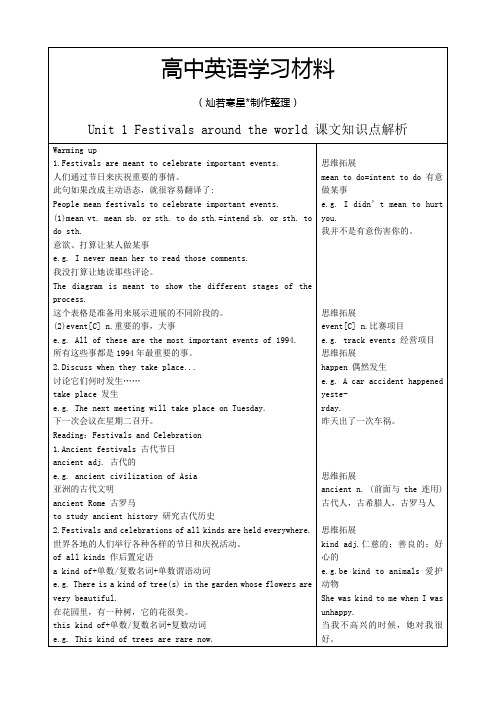
happy memories of his stay in London
对在伦敦幸福的记忆
8.lead the ancestors back to earth
把祖先带回到地球
lead sb. to...把某人带到……
e.g. He led us to his home.
plenty n./pron. 足够;大量
e.g. years of peace and plenty 太平丰收年
There is plenty of room in my bag.
我包里还很空。
6.Some festivals are held to honor the dead,or satisfy and please the ancestors,who could return either to help or do harm.
一些人可能因为他们的动物,花,果实和蔬菜而赢得奖品。
award[C] n. 评价 报酬 奖品
e.g.He has won the best actor award.
他已经获得了最佳男演员奖。
19.In China and Japan there are mid-autumn festivals,when people admire the moon and give gifts of mooncakes.
People mean festivals to celebrate important events.
(1)mean vt. mean sb. or sth. to do sth.=intend sb. or sth. to do sth.
英语:Unit1《Festivals around the world》教案(4)(新人教版必修3)
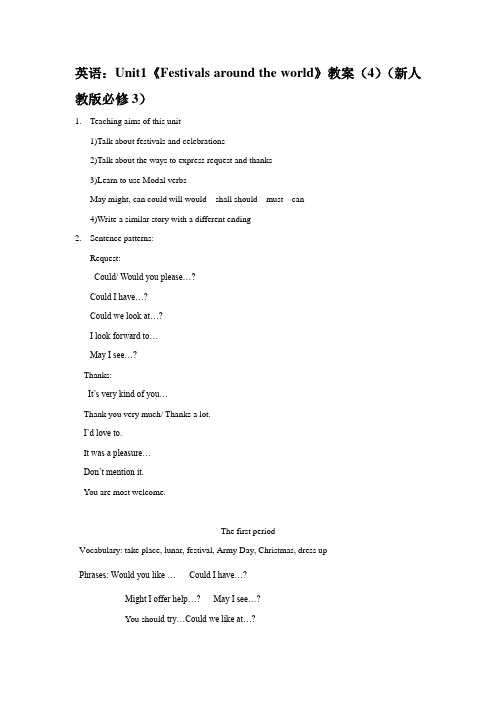
英语:Unit1《Festivals around the world》教案(4)(新人教版必修3)1.Teaching aims of this unit1)Talk about festivals and celebrations2)Talk about the ways to express request and thanks3)Learn to use Modal verbsMay might, can could will would shall should must can4)Write a similar story with a different ending2.Sentence patterns:Request:Could/ Would you please…?Could I have…?Could we look at…?I look forward to…May I see…?Thanks:It’s very kind of you…Thank you very much/ Thanks a lot.I’d love to.I t was a pleasure…Don’t mention it.You are most welcome.The first periodVocabulary: take place, lunar, festival, Army Day, Christmas, dress upPhrases: Would you like … Could I have…?Might I offer help…? May I see…?You shoul d try…Could we like at…?Can you suggest…? We might take…Teaching ProceduresStep I Leading inT: Hello, everybody! Welcome back to school! Did you have a good time in your winter holidays? Ss. Yes. Of course!T: When did you feel most happy and excited?Ss: At the Spring Festival.T: Who can tell us why? Any volunteers?S1: Because it is the most important festival in our country.S2: Because I got a lot of lucky money from my parents.S3: Because I needn’t study at festivals and there was a lot of del icious food to eat. How great.S4: Because I met my cousins and friends who I hadn’t seen for a long time.T. Very food! I am glad to hear that. Today we will talk about festivals, which are meant to celebrate important events. Please think about some other festivals. Can you name just a few? Ss: New year, Yuan xiao festival…:T: Quite right. That’s called the Lantern’s Festival. How about some other festivals?Ss: The Army Day, International Labour’s Day, National Day, Tomb Sweeping Festival, Dragon Boat Festival, Mid-autumn Day…T: You have done a good job, boys and girls! .Step ⅡWarming –upFestivals are meant to celebrate important events. Different countries have different festivals. Work in groups and lost five Chinese festivals that you know. Discuss when they take place, what they celebrate and one thing that people do at that time. The first one is given to you as an example.Step Ⅲ Pre- readingDiscuss in groups of four1.What’s your favourite holiday of the year? Why?2.What festivals or celebrations do you enjoy in your city or town? Do you like spendingfestivals with your family or with friends? What part of a festival do you like best---the music, the things to see, the visits or the food?Step ⅣAssignment1.Consolidation2.Listening to the material again after class to be familiar with it.3.Homework: Collect as much information about festivals as possible.The second period ReadingTeaching Aims1.V ocabulary: starve, starvation, plenty, satisfy ancestor lamps lead feast bone origin in memory ofdress up trick poet arrival national gain independence gather agricultural Europeancustom awards watermelon handsome rooster admire look forward to religious asthough have fun with daily2.To enable the students to know the earliest festivals with reasons for them and fourdifferent kinds of festivals that occur in most parts of the world3.To enable the students to master some English expressions and phrases about festivals.4.Teach the basic reading skills: skimming and scanning.5.Try to compare and make conclusion s of different festivals.Step ⅠRevision1.Greetings.2.Review the new words of this part.3.Check the students’ homework---festivalsStep ⅡReading1.ScanningT: Open your books and turn to page one. I’d like you to do the scanning. Read the te xt quickly and accurately to get the main idea and answer the 6 questions on Page3.( Ask the student to look through the questions and then read the text silently.)( Four minutes later, check the answers with the whole class. Show the suggested answers on the screen.)2.Intensive reading( Allow the students to read aloud and carefully this time to understand the main ideas of each paragraph and the important details)T: Read the text loudly for a second time and them try to tell if these sentences are True or False.3.Reading and discussionT: Read the text a third time and then work impairs to do Exercise 2 on Page 3.( Let the students have enough time to read the passage carefully and discuss the chart with their partners. Encourage them to expand their answers according to their own experiences.)4.Explanation(In this part try to help the students analyse the difficult, long and complex sentences and guess the meaning of the new words; ask them to deal with the language points in the context.)T: Now I will discuss some important sentences and phrases in the passage.a.Some festivals are held to honor the dead, or satisfy and please the ancestors, who couldreturn either to help or to do harm.b.In memory ofc.In India there is a national festival on October 2 to honor Mahatma Gandhi, the leaderwho helped gain India’s independence from Britain.d.People are grateful because their food is gathered for the winter, and because a season ofagricultural work is over.e.The most energetic and important festivals are the ones that look forward to the end ofwinter and to the coming of spring.f.The country is covered with cherry flowers so that it looks as though it might be coveredwith pink snow.The suggested explanation:a.An attributive clause.The sentence means people hold some festivals either to show respect to the dead or to make their ancestors happy in case they might come back to do harm.b.in memory of … serving to recall sb, to keep him fresh in people’ minds.He wrote a poem in memory of his dearest wife, who died in an accident.in honor of ( showing great respect or high public regard)in hopes/the hope of (hoping)in defence of (defending)c. a noun phrase followed by an attributive clause as the appositived.two clauses for reasone.energy→energetic adj. ( full of or done with energy)look forward to ( to is a preposition here.)devote to, be/get used to, get down to , stick toe.g. I’m looking forward to hearing from you.Step Ⅲ ListeningT: Now I will play the tape for you. You can just listen with your books closed or look at your books or read in a low voice together with the tape. It’s up to you. After listening, please write down three things that most festivals seem to have in common.( Comprehending Ex.3 on Page 3).The third period Learning about languageTeaching aims:1.Let the students know the usage of modal verbs.2.Enable the students to recognize the words and expressions in the reading passage accordingto what mean the same as them.Step Ⅰ Greeting and Revision( Ask some students to retell the text we learned .)StepⅡ. Practicing the useful words and expressionsT: As we know, there are two important kinds of verbs---transitive verbs and intransitive verbs. But ma ny intransitive verbs have the structure “verb+preposition+objects ” Can you give me some examples?Ss: Sure. Such as look at the picture, hear from my friends, listen to the radio and so on.T: Ok. Now turn to page 4, Ex. 4. You are to make some sentences of your own, using the words given.S1. I’m looking forward to hearing form my friendS2: We are talking about verbs.S3: Would you like to talk with me?S4: Who can think of an effective solution to the problem?S5: Please think about my proposal.Step Ⅲ Useful StructuresT: Let’s come to the next part. This part is about modal verbs. You are to read the sentences in Ex.1 and then to find out and write down different sentences with modal verbs form the reading passage and try to explain their meanings. If you have any difficulty in understanding them you can refer to Grammar in Pages 92---94Step Ⅳ Summing up and home workT: Boys and girls, today we have practiced useful words and phrases of this unit and the usage of modal verbs. I think it is not easy for you to master them, after class you should review them.Homework1.Practice of WBP42EX.1,2,3.2.Please find out10 sentences with modal verbs, and try to get their meanings.The fourth period ListeningTeaching aims:1.V ocabulary: go with, the big bands, musicians, over and over again, for sale, get used to, thewinners of this year’s awards for the best costumes2.Enable the students to know how to get the key words to understand the conversation aboutthe carnival parade, to talk about sth happened and express request and thanks.Step Ⅰ RevisionAfter checking the WB Ex. 1,2,3 the teacher ask the students to give examples about modal verbs and try to explain them.Step Ⅱ Warming upT: By the way, what’s the topic of this unit?Ss: Festivals around the world.T: Would you like to know something more about festivals around the world?Ss: Of course.T: Now I will show you several pictures. What’s the festival called?Ss: Carnival.T: Yes. This class we will listen to a dialogue about carnivals. First look through the four questions in listening part to find out the listening points.Step Ⅲ ListeningT: I will play the tape for you twice. Please listen carefully and pay much attention to the important points. For the first time you are to make notes beside the questions. For thesecond time, you should write down the answers and then check them with yourpartners.( It’s important to encourage the students to adapt their present knowledge anyskill to a variety of situations wherever they can. Make sure to allow variousexpressions of the answers. Do not demand the same words form all students.)Step Ⅳ SpeakingThis part is intended to give the students the opportunity to practice a telephone conversation using the functional items for requests and thanks. The polite form of English areimportant and should be practiced in a variety of situations.Step Ⅴ Listening taskT: There are about 10 minutes left. Let’s come to listening task. Turn to page 43and look at the pictures. They have something in common. Can you find it out?Ss: They are all about festivals bout the dead.T: That’s right. I will play the tape for you. For the first time you should try towrite down the name of the country where the festival are held. For the next two times you should do Ex2. You can make a brief note first and then complete the chart, according to which you can make a report.The fifth period Extensive readingTeaching aims:1.V ocabulary: heart-broken, turn up, keep one’s word, hold one’s breath, drown one’s sad ness incoffee, set off for, remind somebody of something,2.Learn to compare the festivals in China and in western countries.Step ⅠRevisionCheck homeworkStep ⅡReading (1)T: As we know, there are all kinds of festivals around the world. We have talked about two Chinese festivals for the dead. Today we are going ti read a sad story, which is to introduce a cross cultural view of lovers’ festival—Qi Qiao and Valentine’s Day. Now please read it quickly and find out the sentence below are true or false.T: I think you have got the general idea of the passage. Now please read the passage once more and answer the questions on Page 8.Some language points:Step Ⅲ Discussion and writingT: That’s for the reading part of the passage. Please think about the ending of the story. Are you satisfied with the ending? Different people have different opinions to a matter. Now any one of you have an opportunity to make up an ending to the story. Please engage imaginatively in the story and use your own ideas. Try to use the vocabulary and structures you have learned of you like.Step Ⅳ Reading(2)T: Let’s come to another pass age about carnival in Quebec. Please turn to Page 44, read it quickly and answer the questions in Page 45. Five minutes for you.Added material:Thanksgiving DayFourth Thursday in November is celebrated as ‘Thanksgiving Day’ People thank God for his bl essings. People can ‘Thank’ friends, foes and anyone for the experiences, happiness andsunshine they bring into their lives. Pilgrims celebrated the first Thanksgiving Day in America during the second winter in the new world. The first winter had been bad as nearly half of the people had perished due to lack of food and bad weather. But the following year, with the help of Indians who showed them how to plant Indian corn, the pilgrims had successful harvest. Governor William Bradford decided that December 13, 1621 be set aside for feasting and prayer. The Indians were invited to share the festival. Since than, Thanksgiving Day is been celebrated in America. However, it was only in 1941, the Congress in a joint resolution named the fourth Sunday in November as the official Thanksgiving Day.Dating back, it is known that the Council thought to appoint and set apart the 29th day of June, as a day of Solemn Thanksgiving and praise to God for his Goodness and Favour. The First Thanksgiving Proclamation was however on June 20, 1676. The governing council of Charlestown, Massachusetts, held a meeting to determine how best to express thanks for the good fortune that had seen their community securely established. By unanimous vote they instructed Edward Rawson, the clerk, to proclaim June 29 as a day of thanksgiving, It is also known that the Pilgrims set ground at Plymouth Rock on December 11, 1620. Their first winter was devastating. At the beginning of the following fall, they had lost 46 of the original 102 who sailed on the Mayflower. But the harvest of 1621 was a bountiful one. And the remaining colonists decided to celebrate with a feast -- including 91 Indians who had helped the Pilgrims survive their first year. It is believed that the Pilgrims would not have made it through the year without the help of the natives The feast was more of a traditional English harvest festival than a true "thanksgiving" observance. It lasted three days.Thanksgiving, as we know it today, has come a long way from the Pilgrim's harvest festival in 1621. It is an event that seems, as each year goes by, to reinvent itself and to expand its meaning to larger vistas. Maybe this is the real significance of the occasion; for as we continue to change and grow as a people, there are an increasing number of things for which we can be thankful.HalloweenThe ancient Druids 督伊德教(古代高卢人与不列颠人的一种宗教)的教徒who inhabited what we now call Great Britain placed great importance on the passing of one season to the next, holding "Fire Festivals" which were celebrated for three days (two days on either side of the day itself). One of these festivals was called Samhain (pronounced Sha-V on) and it took place on October 31 through to November 1. During this period, it was believed that the boundaries between our world and the world of the dead were weakened, allowing spirits of the recently dead to cross over and possess the living. In order to make themselves and their homes less inviting to these wayward spirits, the ancient Celts(凯尔特人)would douse (插入水中, 把弄熄, 弄湿)all their fires. There was also a secondary purpose to this, after extinguishing all their fires, they would re-light them from a common source, the Druidic fire that was kept burning at Usinach, in the Middle of Ireland.Samhain was considered to be a gateway not only from the land of the dead to the land of the living, but also between Summer and Fall/Winter. For the Druids, this was the last gasp (喘息, 气喘)of summer (it was also the Celtic New Year), so therefore they made sure it went out with a bang before they had to button down (把...弄清楚)for the winter ahead.They would dress up in bizarre costumes and parade through their villages causing destruction in order to scare off any recently departed souls who might be prowling (巡游)for bodies to inhabit, in addition to burning animals and other offerings to the Druidic deities(神, 神性). It is also a popular belief that they would burn people who they believed to be possessed, but this has largely been debunked (揭穿, 拆穿假面具, 暴露)as myth.This tradition was later brought to the North American continent by Irish immigrants who were escaping the Potato Famine in their homeland. In addition to the festival itself, the immigrants brought several customs with them, including one of the symbols most commonly associated with Halloween -- the Jack 'O Lantern.According to Irish folklore, there once lived a man named Jack who was known for being a drunkand a prankster(顽皮的人, 爱开玩笑的人). One night Jack tricked the devil into climbing a tree, and quickly carved an image of a cross on the trunk, trapping the devil. Jack then made him promise that, in exchange for letting him out of the tree, the Devil would never tempt him to sin again. He reluctantly agreed, but was able to exact his revenge upon Jack's death. Because of his mischievous ways in life, Jack was barred from entering heaven and because of his earlier trick, he was also barred from hell. So he was doomed to wander the earth until the end of time, with only a single ember(灰烬, 余烬)(carried in a hollowed out turnip.[植]芜箐, 芜箐甘蓝) to warm him and light his way.In Ireland, they originally also used turnips for their "Jack Lanterns", but upon arriving in the new world, they discovered that pumpkins were abundant and easier to carve out.EasterOn Good Friday, Jesus Christ was executed by crucifixion. His body was taken down from the cross, and buried in a cave. The tomb was guarded and an enormous stone was put over the entrance, so that no-one could steal the body. On the following Sunday, some women visited the grave and found that the stone had been moved, and that the tomb was empty. Jesus himself was seen that day, and for days afterwards by many people. His followers realised that God had raised Jesus from the dead.Hot Cross BunsHot Cross buns are still made all over England around Easter time. At one time, buns with a cross on them were made all through Lent. They were banned by Oliver Cromwell and brought back again at the time of the Restoration. For a time they were only available on Good Friday but now they can be bought during the month leading up to Easter. Whole meal hot cross buns are becoming more popular each year.The Easter EggAs with the Easter Bunny and the holiday itself, the Easter Egg predates the Christian holiday of Easter. The exchange of eggs in the springtime is a custom that was centuries old when Easter was first celebrated by Christians.From the earliest times, the egg was a symbol of rebirth in most cultures. Eggs were often wrapped in gold leaf or, if you were a peasant, colored brightly by boiling them with the leaves or petals of certain flowers.Today, children hunt colored eggs and place them in Easter baskets along with the modern version of real Easter eggs -- those made of plastic or chocolate candy.O-bon FestivalBon DanceDuring o-bon, bon odori (folk dances) are held all over Japan. The kind of dance varies from area to area. People wearing yukata (summer kimono) go to the neighborhood shrine, temple, or park and dance around a yagura (stage) set up there. Anyone can participate in the dance. Join the circle and imitate what others are doing. Awa odori of Tokushima and bon odori at Yasukuni Shrine, Tokyo are very famous.Also, Toro Nagashi (floating paper lanterns) are held in some areas. On the evening of the 15th, people send off ancestor's spirits with a paper lantern, lit by a candle inside and floated down a river to the ocean. Fireworks displays (Hanabi-taikai) are often held during o-bon. It is a typical Japanese summer scene to see hanabi.Since o-bon is an important family gathering time, many people return to their hometowns during o-bon. Most businesses are closed during this time. Although it is crowded everywhere, it is common for many people take trips during o-bon, too. The beginning and end of o-bon are marked with terrible traffic jams. Airports, train stations, and highways are jammed with travelers. I recommend you do not travel around o-bon!。
(预讲练结四步教学法)高中英语Unit1Alandofdiversity讲读新人教版选修8
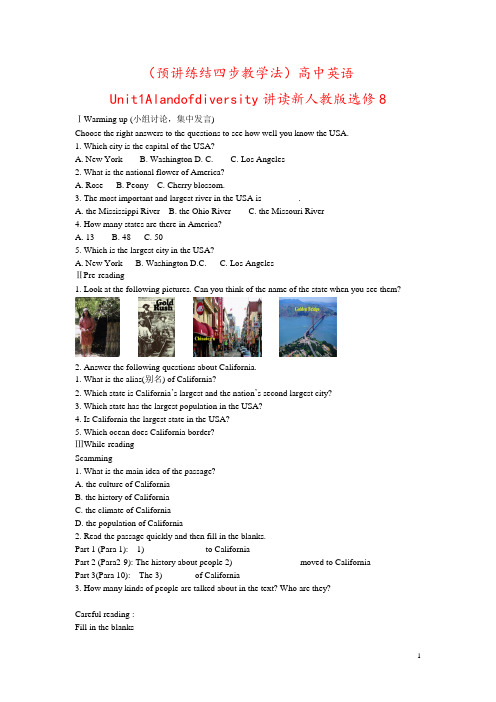
(预讲练结四步教学法)高中英语Unit1Alandofdiversity讲读新人教版选修8 ⅠWarming up (小组讨论,集中发言)Choose the right answers to the questions to see how well you know the USA.1. Which city is the capital of the USA?A. New YorkB. Washington D.C. C. Los Angeles2. What is the national flower of America?A. RoseB. PeonyC. Cherry blossom.3. The most important and largest river in the USA is ________.A. the Mississippi RiverB. the Ohio RiverC. the Missouri River4. How many states are there in America?A. 13B. 48C. 505. Which is the largest city in the USA?A. New YorkB. Washington D.C. C. Los AngelesⅡPre-reading1. Look at the following pictures. Can you think of the name of the state when you see them?2. Answer the following questions about California.1. What is the alias(别名) of California?2. Which state is California’s largest and the nation’s second largest city?3. Which state has the largest population in the USA?4. Is California the largest state in the USA?5. Which ocean does California border?ⅢWhile-readingScamming1. What is the main idea of the passage?A. the culture of CaliforniaB. the history of CaliforniaC. the climate of CaliforniaD. the population of California2. Read the passage quickly and then fill in the blanks.Part 1 (Para 1): 1) _____________ to CaliforniaPart 2 (Para2-9): The history about people 2)_______________ moved to CaliforniaPart 3(Para 10): The 3)_______ of California3. How many kinds of people are talked about in the text? Who are they?________________________________________Careful reading :Fill in the blanksPara 1California is the 1)______ largest state with the 2)__________ population in the USA. It’s also the most 3)___________ state because of its history.Para 21) Is there an exact time when the first people arrived in California?2) How long have the native Americans been living in California?3) How did the native Americans arrive in California?4) Who made the native Americans suffer a lot?Para 31) When did the Spanish soldiers first arrive in South America?2) What was the result of their fighting against the native people?3) What happened in the 18th century?4) Who were the first Spanish to go to California?5) When did California become part of Mexico?6) When did the United States declare war on Mexico?Para 4When did the Russian hunters first settled in California and how many Russian-Americans are living in and around San Francisco?Para 51)When was gold discovered in California?2) Who were the first to arrive California to look for gold, South Americans, Europeans or the Asians?3) When did California become the thirty-first federal state of the USA?Para 9How many kinds of people from different countries in Asia are mentioned in this paragraph?__________________________________________Para 10What will California be like in the future?_________________________________ⅣPost-reading1. Read the text carefully again and choose the best answers.1) Which is wrong about what happened to native Americans when the Europeans arrived?A. Thousands of the natives were killed.B. The native Americans lived happily together with the Europeans.C. The native Americans were forced into slaveryD. The native Americans suffered greatly.2) Why did the religious men from Spain arrived in California?A. To fight against Mexico.B. To rush for gold.C. To teach the Catholic religion to the natives.D. To develop the west part of USA.3).How many Californians speak Spanish as a first or second language?A. Exactly 40% of CaliforniansB. About 40% of CaliforniansC. Less than 40% of CaliforniansD. Over 40% of Californians4)Why did so many people rush to California after 1848?A. To realize the dream of becoming rich.B. To work on the farms there.C. To build railway.D. To help Americans fight against Mexico.5) No specific group is mentioned in _________.A. Native AmericansB. Gold MinersC. The FutureD. Later Arrivals2.True (T) or False (F)1) California is the largest state in the USA and has the largest population.2) The native Americans were well treated after the arrival of Europeans.3) Of the first Spanish to California, the majority were religious men.4) In the early 1800s, Russian hunters began settling in California.5) During Gold Rush Period, many achieved their dream of being rich.6) California became the thirty-first state of the USA in 1850.7) It is believed that soon there will be only a mixture of many races and cultures.8) In the late 19th century, Chinese immigrants arrived in California.3. Reorder the following subtitles according to the text.A. The futureB. Native AmericansC. Most recent arrivalsD. Later arrivalsE. The SpanishF. Golden minersG. Russians4. Choose the best word to fill the passageCalifornia is the most 1)___________ state in the USA. The first settlers arrived in California by 2)_________ of a land bridge. In the 18th century, California was 3)_____ by Spain, which had a deep effect on California. In 1848, gold was discovered in California, and the dream of becoming 4) ______ attracted people from all over the world. In the 1860s the building of the rail network 5) ______ more Chinese there. In more recent decades, California has became 6) ________ to more people from Asia. Attracted by the climate and the 7)________, many people have been 8) ___________ to California. In the near future, California will become a 9)_________ of many races and cultures 10) _______ any major racial or cultural groups.ⅤDiscussion:(四人一组讨论,合作探究,每组出一名代表发言。
高中英语 Unit 1 Festivals around the world课前预习 新人教版必修3
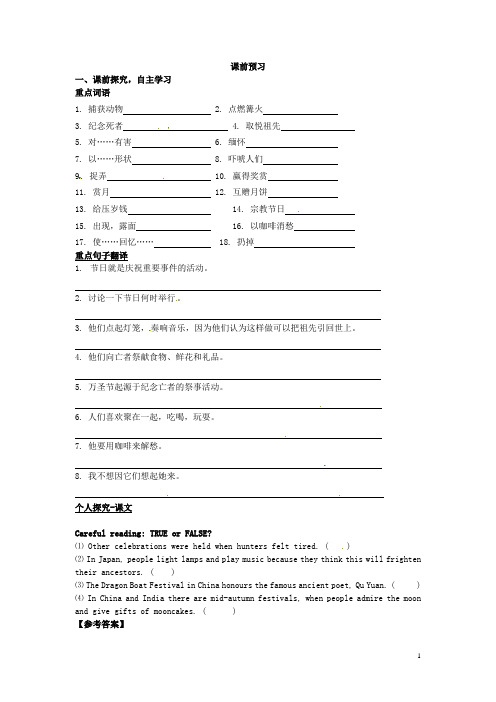
课前预习一、课前探究,自主学习重点词语1. 捕获动物2. 点燃篝火3. 纪念死者4. 取悦祖先5. 对……有害6. 缅怀7. 以……形状 8. 吓唬人们9. 捉弄 10. 赢得奖赏11. 赏月 12. 互赠月饼13. 给压岁钱14. 宗教节日15. 出现,露面16. 以咖啡消愁17. 使……回忆…… 18. 扔掉重点句子翻译1.节日就是庆祝重要事件的活动。
2. 讨论一下节日何时举行。
3. 他们点起灯笼,奏响音乐,因为他们认为这样做可以把祖先引回世上。
4. 他们向亡者祭献食物、鲜花和礼品。
5. 万圣节起源于纪念亡者的祭事活动。
6. 人们喜欢聚在一起,吃喝,玩耍。
7. 他要用咖啡来解愁。
8. 我不想因它们想起她来。
个人探究-课文Careful reading: TRUE or FALSE?⑴ Other celebrations were held when hunters felt tired. ( )⑵In Japan, people light lamps and play music because they think this will frighten their ancestors. ( )⑶The Dragon Boat Festival in China honours the famous ancient poet, Qu Yuan. ( )⑷ In China and India there are mid-autumn festivals, when people admire the moon and give gifts of mooncakes. ( )【参考答案】重点词语1. catch animals2. light fires3. honour the dead4. satisfy and please the ancestors5. do harm6. in memory of7. in the shape8. frighte n people9. play a trick 10. win awards 11. admire the moon 12. give gifts of mooncakes 13. give children lucky money 14. religious festivals 15. turn up 16. drown one’s sadness in coffee17. remind sb. of 18. throw away重点句子翻译答案见课本P76---P79课文注释。
【预讲练结四步教学法】英语人教版必修UnitCanadaTheTrueNorth讲读

【预讲练结】人教版必修三Unit 5 Canada--The True North讲读ⅠWarming up (小组讨论,集中发言)1. Do you like traveling? Which country have you ever been to?2. Do you know anything about Canada? What language do Canadians speak? What is the capital of Canada? What is the national animal of the country? What is the Canadian leader called? Do you know the names of famous lakes in Canada?ⅡPre-reading1. Look at the pictures above. They show something about Vancouver, the Rocky Mountains, the Calgary Stampede and Thunder Bay. What do you think of the places?2. If you had a chance to go one of the places, which of them do you like to go most?ⅢWhile-readingScamming1. What is the main idea of the passage?_________________________________________________2. Divide the passage into three parts match the main idea with them.Part 1 (Para 1): A. What they really saw and felt after boarding the train.Part 2 (Para 2): B. Brief introduction of their trip.Part 3 (Paras3-5):C. Their chat on their way to the station.Careful reading :Fill in the blanksPara 1brief introduction about the tripwho 1)_____ and her cousin 2)________why to 3)__________________where(destination) 4)_____________________how(transportation) First by 5)_______ then by 6)_________Para 2Para 3Para 4Para 5Which city is their next destination?___________________________________ⅣPost-reading1. Read the text carefully again and choose the best answers.1) Which of the following is described as the most beautiful city in Canada?A. VancouverB. CalgaryC. TorontoD. Montreal2) What does the word “slightly ”in the text mean?A. a bitB. a lotC. greatlyD. lightly3). Why did they begin to realize two days later that Canada is quite empty?A. Because there are only thirty million people living on such a huge land.B. Because they found nobody on their way.C. There are too many lakes in Canada.D. Because Canada is surrounded by Oceans on three sides.4) Which of the following statements is true according to the text?A. Li Daiyu and Liu Qian went to Canada to see their cousins in Montreal.B. Thunder Bay is a port city in the south of Canada near Toronto.C. The girls looked out of the windows and saw Native Indians and cowboys.D. Li Daiyu and Liu Qian went to Canada to see their relatives on t he Atlantic coast.2.True (T) or False (F)1) They will take the train across Canada westward.2) You can cross Canada in less than five days.3) Vancouver is the coldest part in Canada.4) It is so wet in Vancouver that the trees are tall.5) Canada is a large country with a small population.6) The ocean ships cannot go to Thunder Bay.7) Toronto is to the south of Thunder Bay.8) Their trip across the whole continent was exciting because of some great scenery.9) Their cousins took them and their baggage to catch “The True North”.10) Canada has more fresh water than any other country in the world.3. Reorder the following names according to what you read in the passage.A. Thunder BayB. CalgaryC. Rocky MountainsD. TorontoE. VancouverF. Montreal4. Choose the best word to fill the passageLi Daiyu and Liu Qian took the train in Canada from 1)_________ to 2) _________. Their friend, Danny Lin, took them to the train station to catch 3) _________. Canada is the 4) _________ biggest country in the world. It is 5500 kilometers from 5) _________to 6) _________. As they go 7) _________, they saw beautiful scenery as well as cities. 8) _________ is surrounded by mountains on the 9) _________ and east. When they were crossing the Rocky Mountains, they caught sight of mountain goats and a grizzly 10) _________. The next stop is 11)_________, which is famous for Calgary Stampede. After that, they went through a 12) _________ province and 13) _________, which is at the top of the Great Lakes.That night as they slept, the train rushed across the top of Lake 14) _________, in the direction of 15)_________.答案:While-reading:Scamming:1 A description about the trip on “The True North”.2 BCACareful reading:Para 1.1) Li Daiyu2) Liu Qian3) visit their cousins4) Montreal, Canada5) plane6) trainPara 2.1)Their friend Danny Lin.2) the cross-Canada train.3) eastward4) mountains5) lakes6) forest7) wide rivers8) large cities9) mountains and the Pacific Ocean10) wet11) sailing12) oldest13)beautiful14) rapidlyPara 3.1) mountain goats2) a grizzly bear3) an eagle4) the Calgary Stampede5) Cowboys6) compete7)riding wild horses8) thousands ofPara 4.1)They realized that Canada is quite empty.2)Slightly over thirty million.3)Thousands of acres.4)At the top of the Great Lakes.5)Because of the Great Lakes.6)One-third of the world’s fresh water.Para 5. TorontoPost-readingAAADFFFTTFTTFT3. E-C-B-A-D-F4. 1) west 2) east 3) the True North 4)second 5) coast 6) coast 7) eastward 8) Vancouver 9)north 10) bear 11) Calgary 12)wheat-growing 13)Thunder Bay 14)Superior 15) Toronto。
【预讲练结四步教学法】14-15英语人教版必修3:Unit 4 Astronomy讲读
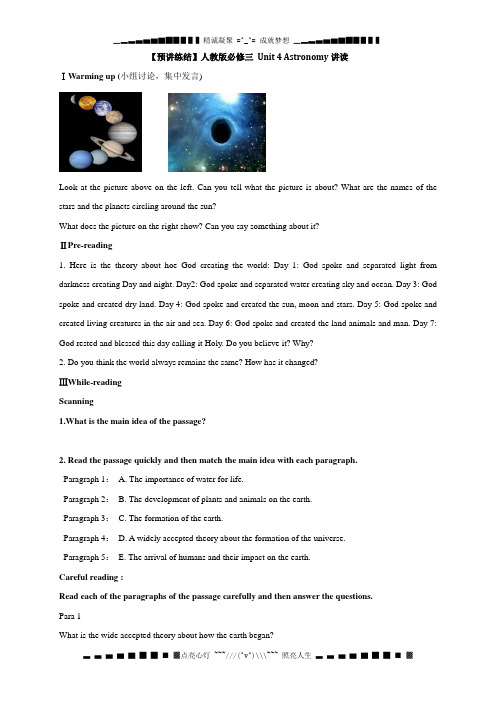
【预讲练结】人教版必修三Unit 4 Astronomy讲读ⅠWarming up (小组讨论,集中发言)Look at the picture above on the left. Can you tell what the picture is about? What are the names of the stars and the planets circling around the sun?What does the picture on the right show? Can you say something about it?ⅡPre-reading1. Here is the theory about hoe God creating the world: Day 1: God spoke and separated light from darkness creating Day and night. Day2: God spoke and separated water creating sky and ocean. Day 3: God spoke and created dry land. Day 4: God spoke and created the sun, moon and stars. Day 5: God spoke and created living creatures in the air and sea. Day 6: God spoke and created the land animals and man. Day 7: God rested and blessed this day calling it Holy. Do you believe it? Why?2. Do you think the world always remains the same? How has it changed?ⅢWhile-readingScanning1.What is the main idea of the passage?_________________________________________2. Read the passage quickly and then match the main idea with each paragraph.Paragraph 1:A. The importance of water for life.Paragraph 2:B. The development of plants and animals on the earth.Paragraph 3:C. The formation of the earth.Paragraph 4:D. A widely accepted theory about the formation of the universe.Paragraph 5:E. The arrival of humans and their impact on the earth.Careful reading :Read each of the paragraphs of the passage carefully and then answer the questions.Para 1What is the wide accepted theory about how the earth began?Para 21.When did the dust settle into a solid globe?2.What make the earth’s atmosphere?Para 3What’s does the continued presence of water lead to?Para 41.Where did the first extremely small plants began to appear?2. Which appeared earlier, green plants or land animals?3. Where did amphibians live?4. What’s the difference between reptiles and mammals in producing young?Para 5What is the problem human being are faced with? Do you think life will always continue on the earth? ⅣPost-reading1. Read the text carefully again and choose the best answers.1). Why was the earth different from other planets?A. it produced a lot of heat.B. The water remained.C. Water disappeared.D. It was the oldest planet.2). Why was life able to develop on the earth but not on other planets?A. The earth had a solid shape.B. The earth did not have harmful gases in its atmosphere.C. The water stayed on the earth but not on other planets.D. The earth was not too hot and not too cold.3). Why was it necessary for plants to grow before animals?A. Animals needed plants to protect them from the sun.B. Plants provided oxygen for animals to breathe.C. Animals could hide from hunters in forest.D. It was easier for plants to grow.4). What problem is caused by human being?A. They exist everywhere on the earth.B. They cause global warming.C. They find new methods of growing crops.D. They enjoy hunting and fishing.2.True (T) or False (F)1) According to a widely accepted theory, the universe began with a Big Bang, after which the earth was still a cloud of dust for several billion years.2) As the earth cooled down, water began to appear on its surface.3) Water allowed the earth to dissolve harmful gases and acids, and it only appeared on the earth.4) As for mammals, they produced young generally by laying eggs.5) Clever animals with hands and feet, in their turn, are protecting the earth well instead of other less important animals.3. Reorder the following jumbled sentences.A. Insects and amphibians appearB. a solid ballC. reptiles appearD. a cloud of dustE. shellfish and other fish appearF. dinosaurs appearG. small plants grow on the waterH. plants begin to grow on dry landI. presence of waterJ. mammals (including humans) appear4.choose the best word to fill the passageAfter the Big Bang, the earth was a cloud of 1)_______. Later the dust 2)______ into a ball. And then it 3)_______ loudly with fire and rock, which were in time to 4)_______ the water vapor, carbon dioxide…, which were to make the earth’s 5)_______. As the earth 6)________ down, 7)_______ began to appear on its surface. Water had 8)________ from other planets or satellites, but it 9)________ on the earth. That made it possible for life to begin to 10)_______.答案:While-reading:Scamming:1.How life began on the earth 2. DCABECareful reading:Para 1.The universe began with a Big Bang that threw matter in all directions. After that, atoms began to form and combine to create stars and other bodies.Para 2.1. Between 4.5 to 3.8 billion years ago.2. Water vapor, carbon dioxide, oxygen, nitrogen and other gases.Para 3.It allowed the earth to dissolve harmful gases and acids into the oceans and seas, and this produced a chain reaction, which made it possible for life to develop.Para 4.1. On the surface of the water.nd animals.3.On land as well as in the water.4.Reptiles lay eggs while mammals give birth to young babies.Para 5.The earth is becoming hotter and hotter. If man could solve the problem of green-house effect, life would continue.Post-reading1.BBBB2.TTFFF3. D-B-I-G-E-H-A-C-F-J4. 1) dust 2) settled 3) exploded 4)produce 5)atmosphere 6) cooled 7) water 8) disappeared 9) stayed 10) develop。
【预讲练结四步教学法】英语人教版必修UnitAstronomy总结
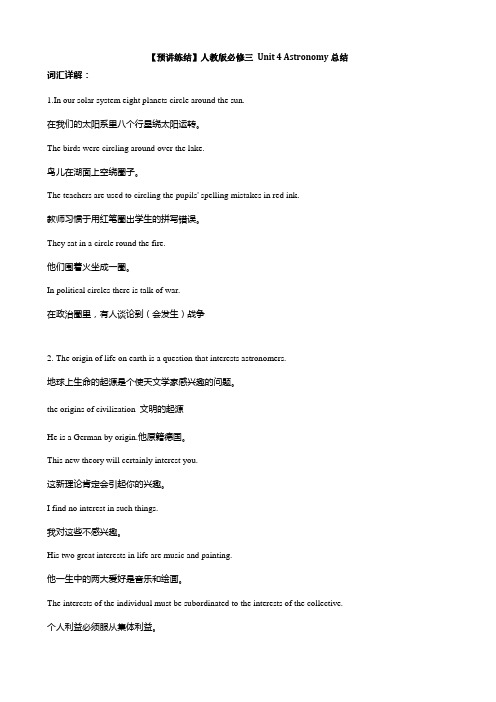
【预讲练结】人教版必修三Unit 4 Astronomy总结词汇详解:1.In our solar system eight planets circle around the sun.在我们的太阳系里八个行星绕太阳运转。
The birds were circling around over the lake.鸟儿在湖面上空绕圈子。
The teachers are used to circling the pupils' spelling mistakes in red ink.教师习惯于用红笔圈出学生的拼写错误。
They sat in a circle round the fire.他们围着火坐成一圈。
In political circles there is talk of war.在政治圈里,有人谈论到(会发生)战争2. The origin of life on earth is a question that interests astronomers.地球上生命的起源是个使天文学家感兴趣的问题。
the origins of civilization 文明的起源He is a German by origin.他原籍德国。
This new theory will certainly interest you.这新理论肯定会引起你的兴趣。
I find no interest in such things.我对这些不感兴趣。
His two great interests in life are music and painting.他一生中的两大爱好是音乐和绘画。
The interests of the individual must be subordinated to the interests of the collective. 个人利益必须服从集体利益。
3. However,according to a widely accepted theory, the universe began with a “Big Bang” that threw matter in all directions.但是,一种普遍为人们所接受的理论是:宇宙起源于一次大爆炸,这次大爆炸将物质投射到四面八方。
高中英语Unit1Festivalsaroundtheworld课前预习学案新人教版必修3
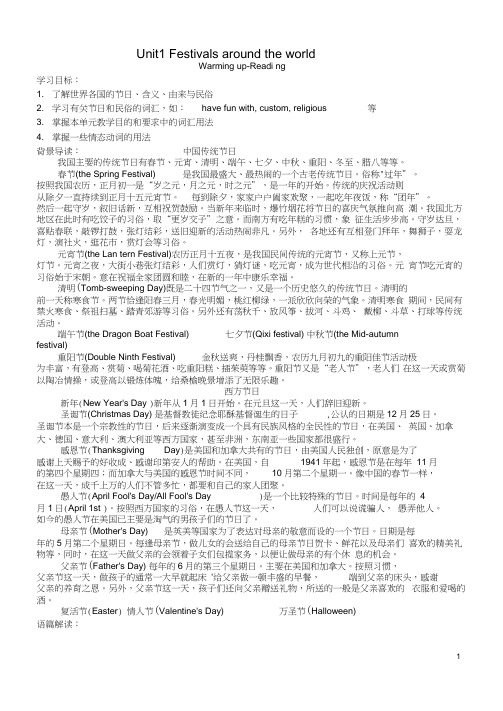
Unit1 Festivals around the worldWarming up-Readi ng学习目标:1. 了解世界各国的节日、含义、由来与民俗2. 学习有关节日和民俗的词汇,如:have fun with, custom, religious 等3. 掌握本单元教学目的和要求中的词汇用法4. 掌握一些情态动词的用法背景导读:中国传统节日我国主要的传统节日有春节、元宵、清明、端午、七夕、中秋、重阳、冬至、腊八等等。
春节(the Spring Festival) 是我国最盛大、最热闹的一个古老传统节日。
俗称"过年”。
按照我国农历,正月初一是“岁之元,月之元,时之元”,是一年的开始。
传统的庆祝活动则从除夕一直持续到正月十五元宵节。
每到除夕,家家户户阖家欢聚,一起吃年夜饭,称“团年”。
然后一起守岁,叙旧话新,互相祝贺鼓励。
当新年来临时,爆竹烟花将节日的喜庆气氛推向高潮。
我国北方地区在此时有吃饺子的习俗,取“更岁交子”之意。
而南方有吃年糕的习惯,象征生活步步高。
守岁达旦,喜贴春联,敲锣打鼓,张灯结彩,送旧迎新的活动热闹非凡。
另外,各地还有互相登门拜年,舞狮子,耍龙灯,演社火,逛花市,赏灯会等习俗。
元宵节(the Lan tern Festival)农历正月十五夜,是我国民间传统的元宵节,又称上元节,灯节。
元宵之夜,大街小巷张灯结彩,人们赏灯,猜灯谜,吃元宵,成为世代相沿的习俗。
元宵节吃元宵的习俗始于宋朝。
意在祝福全家团圆和睦,在新的一年中康乐幸福。
清明(Tomb-sweeping Day)既是二十四节气之一,又是一个历史悠久的传统节日。
清明的前一天称寒食节。
两节恰逢阳春三月,春光明媚,桃红柳绿,一派欣欣向荣的气象。
清明寒食期间,民间有禁火寒食、祭祖扫墓、踏青郊游等习俗。
另外还有荡秋千、放风筝、拔河、斗鸡、戴柳、斗草、打球等传统活动。
端午节(the Dragon Boat Festival) 七夕节(Qixi festival) 中秋节(the Mid-autumnfestival)重阳节(Double Ninth Festival) 金秋送爽,丹桂飘香,农历九月初九的重阳佳节活动极为丰富,有登高、赏菊、喝菊花酒、吃重阳糕、插茱萸等等。
- 1、下载文档前请自行甄别文档内容的完整性,平台不提供额外的编辑、内容补充、找答案等附加服务。
- 2、"仅部分预览"的文档,不可在线预览部分如存在完整性等问题,可反馈申请退款(可完整预览的文档不适用该条件!)。
- 3、如文档侵犯您的权益,请联系客服反馈,我们会尽快为您处理(人工客服工作时间:9:00-18:30)。
【预讲练结】人教必修三Unit 1 Festivals around the world预习1. gather vt. & vi. 聚集; 采摘; 收集; 收获People are grateful because their food is gathered for the winter and the agricultural work is over. 人们都心怀感激,因为越冬的粮食收集起来了,农活结束了。
(P2)1)He managed to gather a small group of curious passers-by round the platform.______________________________________________________________2)他鼓足了气力要决斗。
He ______________ for the fight.3)请给我摘一些花。
________________________________________4)他正忙着搜集有关鸟的信息。
______________________________________________5)With the development of technology, information is not difficult ________ any more.A. to be gatheredB. gatheringC. to gatherD. being gathered易混辨析collect/gathercollect 通常表示有目的或有挑选的收集gather 一般表示由少积多的收集6) My hobby is __________________(集邮).2. gain vt. & vi. 获得; 得到; 赢得; 加快(速度); 增加(体重)n. 利润;获益India has a national festival on October 2 to honor Mohandas Gandhi,the leader who helped gain India,s independence from Britain.印度在十月二日有个全国性节日,纪念莫汉达斯.甘地,他是帮助印度脱离英国而独立的领袖。
(P2)1) He gained additional honors with each new book he published._______________________________________________________2)为了赢得时间,我假装没有听到那个问题。
___________________, I pretended that I had not heard the question.3)下坡的时候,这辆车的速度越来越快。
The car _______________ as it went down the hill.4)上个礼拜我又长了五镑体重。
Last month I _________________________5)这表每天快五分钟。
__________________________________________6) No pains, no gains._________________________________________7) Each of the boys has _________ a prize.A. gainedB. awardedC. caughtD. accepted3. admire vt.欣赏,佩服China and Japan have mid-autumn festivals, when people admire the moon and in China,enjoy moon cakes. 中国和日本都有中秋节,这时人们会赏月。
在中国,人们还品尝月饼。
(P2)1)I really admire the way she brings up those kids all on her own.___________________________________________________________2)我们在半路停下来欣赏风景。
We stopped halfway to ___________________________3)路易斯由于工作出色非常受人尊重。
________________________________________4) He is ___a brave man. We can't admire his courage____.A. actually, very muchB. indeed, a lotC. really, too muchD. truly, a bit4. turn up vt. & vi.赴约; 出席; 出现; 把(收音机等)开大一些But she didn’t turn up. 但是,他没有来。
(P7)1)不知为什么他没来。
___________________________________________________2) Don’t bother to look for my umbrella; it will turn up some day._________________________________________________3)把收音机开大点,我几乎听不到节目。
___________________________ I can hardly hear the program.易混辨析turn down/ turn up/turn on/ turn offturn down (音量)放小;(光线)调暗;拒绝turn up (音量)放大;(光线)调亮turn on 打开(开关、按钮)turn off 关(开关、按钮)4)The radio is too loud. Will you please ________ ?A turn it downB turn it upC turn off itD turn down it5. hold vt. vi. 握住;拿在手上;抱着;容纳;盛;举行;处于某种姿势或位置Well, he was not going to hold his breath for her to apologize.他不想屏息等她来道歉。
(P7)1)She held me by the sleeve.____________________________________________2)我给你照相的时候请保持不动。
___________________ for a few minutes while I take a picture for you.3)这个戏院能容纳一千人。
___________________________________________4)明天要举办的会议非常重要。
The meeting ___________tomorrow is very important.5) —Hello. Is Tom there ?—Hold on, please. I______ if I can find him for you.A. would seeB. seeC. have seenD. will see6. remind vt. & vi. 使……想起;提醒I don’t want them to remind me of her.我不想因它们想起她来。
(P7)1)That story you have just told reminds me of an experience I once had._______________________________________________2)一看到这块表我就知道迟到了。
The sight of the clock_________________________________3)提醒我明天吃药。
__________________________________________________4) —You should _______me of the meeting tomorrow morning .—Don’t worry. I will.A adviseB suggestC remindD permit7. At that time people would starve if food was difficult to find, especially during the cold winter months.在那个时代,如果食物难以找到,特别是在寒冷的冬月,人们就会挨饿。
(PI)有些形容词(如easy, difficult, good, hard, interesting)作表语,其后的不定式被视为省略了逻辑主语,因此不定式用主动形式表被动含义。
1)English is hard (for me) to learn._____________________________________2)玛丽容易被骗。
__________________________________3)这蛋糕很容易做。
___________________________________4)The instructions are hard to follow.__________________________________5)我觉得这文章难懂。
__________________________________修饰上述形容词的不定式通常与其所在句子主语呈动宾关系,因此不定式是不及物动词时要带介词。
例如:6)爱丽丝容易相处。
Alice is easy _____________________7)这个房间住起来很舒服。
_________________________________8. The country, covered with cherry tree flowers, looks as though it is covered with pink snow.整个国度到处是盛开的樱花,看上去就像覆盖了一层粉红色的雪。
(P2)as though / as if就像似的,就仿佛……似的as if/ as though引起的从句中,动词一般用虚拟语气,be通常用were这个形式,不管是什么人称。
